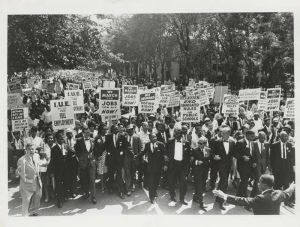 A message from our CEO Eshauna Smith for Martin Luther King Jr. Day (originally posted on LinkedIn):
A message from our CEO Eshauna Smith for Martin Luther King Jr. Day (originally posted on LinkedIn):
In 1967, the great Dr. Martin Luther King, Jr. spoke at Stanford University in what would become one of his most famous addresses: “The Other America.” In one America, “millions of young people grow up in the sunlight of opportunity,” he said, while “children in this other America are forced to grow up with clouds of inferiority forming every day in their little mental skies.”
He spoke these words after the passage of the Civil Rights Act, and after the passage of the Voting Rights Act. He knew that despite this key progress, the undoing of centuries of systemic racism was just beginning. “It’s much easier to integrate a lunch counter,” he said, “than it is to guarantee a livable income and a good solid job.”
Five decades later, despite the incredible progress we’ve made, Dr. King’s words still ring true for too many young men and women of color. For the past 60 years, unemployment rates have been higher for black Americans than white Americans – that is still true today. Also true is that number of young black people neither working nor in school is almost double that of young white people. True, too, is that recent research has shown that income inequality between black and white men, regardless of the socioeconomic status of their family growing up, persists into adulthood.
Though the opportunity gap has narrowed for young men and women of color, too many are still looking through the window at success, rather than seeing success mirrored back at them. Just 8.7 percent of Fortune 500 and S&P 500 CEOs are minorities. Across local, state, and federal government, just 11 percent of elected officials are women or men of color. It’s hard to dream when you don’t see yourself reflected in the pictures of success across our society.
Dr. King knew that access to economic opportunity is a fundamental racial justice issue. Without a system that grants more equitable access to jobs, young people of color will continue to be left behind. Yet without the kind of skills and experiences that correlate with higher job quality later in life, from early paid work experience, to employability skills and social capital, how can youth begin to get around this broken system?
In his remarks that day in 1967, Dr. King said: “It’s a nice thing to say to people that you ought to lift yourself by your own bootstraps, but it is a cruel jest to say to a bootless man that he ought to lift himself by his own bootstraps.” It takes that initial opportunity, that initial access to the tools of success, for young people to succeed. Once that door is open, they bound right through it with immense talent and drive.
So today, as we reflect on the values Dr. King stood for – brotherhood, compassion, equality, justice – I urge us all take a hard look at the work that remains to be done to build brighter futures for all youth. Thanks to Dr. King and the countless Americans who have fought for equality over the centuries, far more young people in this America are feeling ‘the sunlight of opportunity.’
“Social progress never rolls in on the wheels of inevitability,” Dr. King said. “It comes through the tireless efforts and the persistent work of dedicated individuals.”
What will be your work? How will you help? It can be as simple as opening your door.
Eshauna Smith is the CEO of Urban Alliance, a national youth development that aims to open the door to economic opportunity for economically-disadvantaged youth through paid internships, job skills training, and mentoring.